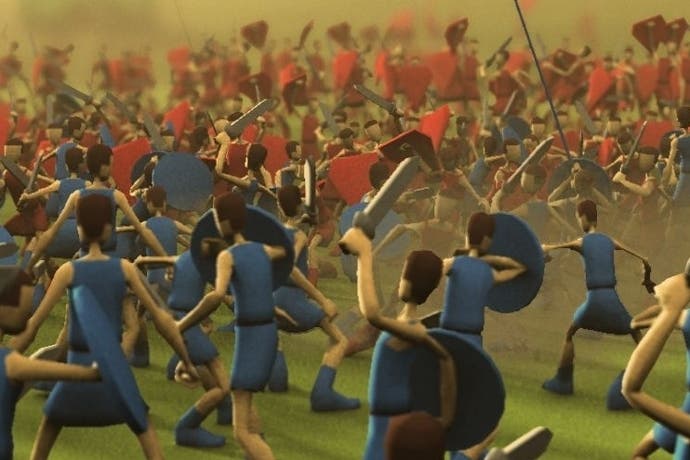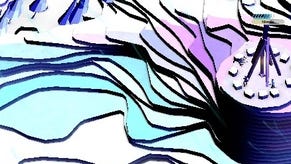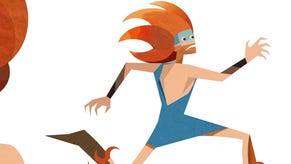"There is no shop." Super clicking, F2P and Godus with Peter Molyneux
As Update 1.3 goes live, Molyneux's verdict on controversial micro-transactions.
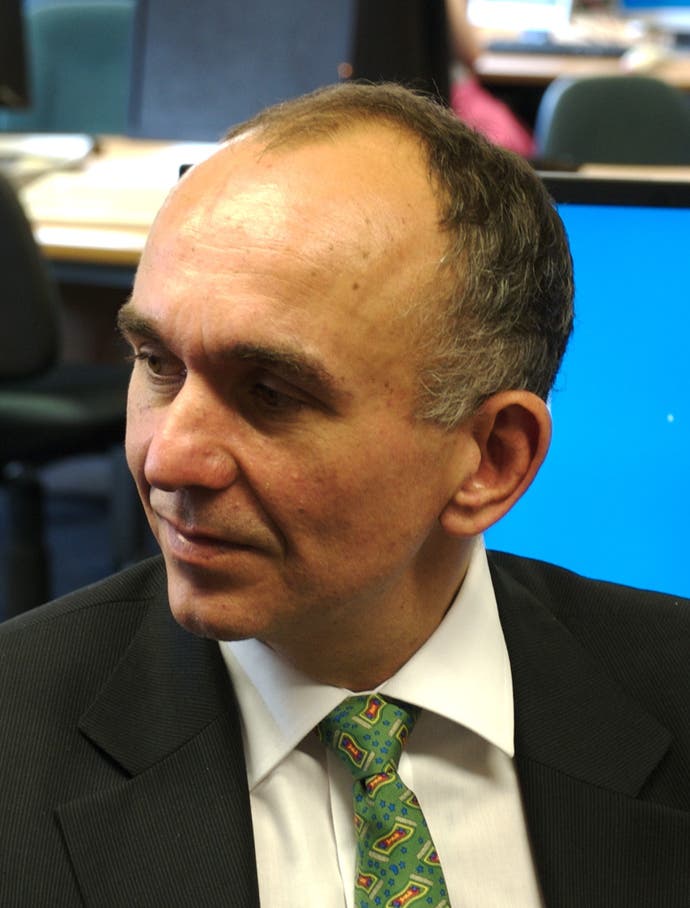
"There is no shop."
Those are the big, bold words that scream out of Peter Molyneux's laptop. It's not quite a "there is no spoon" moment, but it's an eye-opening revelation nonetheless.
You see, some thought Godus, Peter Molyneux's new game, would contain a shop, eventually, because, well, it's right there in the £15 Steam Early Access version. Displayed in the upper right-hand corner of the screen is your gem total, and clicking on this number used to take you to a window that suggested you'd be able to buy gems with real-world money. Here they were, the dreaded micro-transactions, in plain sight.
As you'd expect, players kicked off. This wasn't in the Kickstarter, they claimed. No-one told us Godus was pay-to-win, they barked. Then, Guildford developer 22Cans reacted to the uproar and plastered the message, "There is no shop," inside the virtual shop window for everyone who clicks on their gem total in the top right-hand corner of the screen to see.
And now, after a typically impassioned EGX 2013 developer session (which you can watch in the video below), Molyneux opens his laptop, boots up the game and clicks on his own gem total in response to my question. "There is no shop," it says. Done. Dusted. Dead issue. Or is it?
Here, in an interview with Eurogamer, Molyneux discusses Update 1.3, which he says improves drastically the game, talks about Bryan Henderson, the 18-year-old winner of the Curiosity experiment who gets a cut of the game's revenue for six months, and reveals how 22Cans has changed Godus' design to tackle the problem of super clicking.
Oh, and of course, there's some chat about the shop.
You mentioned on stage that Bryan is limited in how he can affect Godus, but the moral choices he gets to make, such as around contraception, sound like they could really have an impact.
Peter Molyneux: The three areas we want to give him control of are the trivial, which can be amusing, funny and interesting; the moral, which are more questions we pose and the community poses - you'll see this slowly layer in (you can decide, I want Bryan as God of Gods to give his moral guidance on this issue. Some of them will be from us and some will be from the community playing the game); and the last area is little tweaks he can make in the gameplay that won't throw the game out of balance.
The way we've designed the game is to make almost everything we can think of in the game data driven. You can do that if you think about that from the ground up. Because everything's based on simulation, we can adjust everything, from the amount of time two little followers will woo each other, to whether or not they'll have to go through some ceremony before they would have sex. It's down to that level of detail that I can control the actual simulation.
And then we can say, okay, by mixing these variables together we can answer moral questions: how aggressive are your followers? How aggressive are they to something new? Remember that red-haired guy who came in? If I turn one variable up all the little followers will just beat him up and throw him out. Or I can turn it down and they will welcome him into their houses. All that stuff is data driven, so when Bryan makes a commandment we don't have to code that commandment.
What's your take on him?
Peter Molyneux: In one sense he's the worst person for it, because he's like the bloke who walked into the newsagent, bought a lottery ticket for the first time and won the jackpot. In another sense he's perfect. He's a bit of a gamer, but not too much of a gamer. He's 18. He's said himself, "I just play guitar in my bedroom, and suddenly I've got all this happening."
We haven't turned on his powers yet because when we do we want to make sure the systems are working right. We're doing Update 1.31, and that's going to start connecting all the worlds together, so we can control them with balance bars. Once that's right, then we'll start thinking of introducing Bryan into the world.
Is he up for what's expected from him?
Peter Molyneux: He came down and met us. People started sending all these tributes to him. He tweeted he likes milkshakes and within three hours 40 milkshakes turned up at his door. A lot of them arrived at our address and we had a table full of milkshakes just because he said he liked milkshakes.
He gets a percentage of everything Godus makes. He's already earning from the game. It's a low percentage - it's not 10 per cent or anything. There's an account and all that money's being accrued to him. When he gets a cheque through the post and it's going to be all this money, that is... He seems to be into his tributes at the moment more than the money. It's an amazing thing to do.
And then his reign only lasts six months.
So he'll get a cut of the revenue generated during his reign only?
Peter Molyneux: Yep. It's only for six months. Then he's challenged to a match of Godus by one of the Godus players in the real world who has earned the right to challenge him. Whoever wins that match is the new God of Gods. It could be Bryan again. They would then get the royalties. The royalties are there for the life of Godus. Whoever is God of Gods gets the royalties. And it could be a lot of money.
I remember when you were teasing what's inside the cube of Curiosity, you said it was life changing. Is that life changing?
Peter Molyneux: Within an hour of him getting to the centre of the cube he was on BBC News and being interviewed by Wired magazine. He said, "What the hell's happened?" He's a minor celebrity in Edinburgh now.
When all is said and done, will he make five figures?
Peter Molyneux: It depends purely how successful the game is. If it's super successful it could be a lot of money. If it's super successful then the event of being God of Gods will be compulsive to people.
"It's not selling millions or anything like that, but considering it's Early Access, it's beta and it's got bugs and there's a blocker, it's doing amazingly well at the moment."
Peter Molyneux
The Steam Early Access version has been out now for a couple of weeks now. Are you making a lot of money out of this game already? Is it selling well?
Peter Molyneux: It's not selling millions or anything like that, but considering it's Early Access, it's beta and it's got bugs and there's a blocker - the Mahogany Card which enables you get through to the Bronze Age we hid too well so no-one's found it - considering all that it's doing amazingly well at the moment.
This is the first time I've talked about it since its release. I know this sounds a bit crazy, but we're trying not to overexpose it until at least the first month is over and done with. It's so turbulent. The update completely changes all the rules of the game. So we don't want to say this is Godus until it's gone through that loop for at least a month.
And then we'll move to a major version, Beta 2.0, which means everyone will be playing connected worlds, you'll be able to play all the way up to the Imperial Age, and you'll be able to play as Clans. So there's a lot of stuff we have to introduce before that.
But it's been more successful than anyone would dare hope. I think - I don't know - but I think it's the most successful Early Access game. It was number one on Steam for 10 days, so it was outselling everything else on Steam.
When do you intend to take Godus out of beta and Steam Early Access?
Peter Molyneux: We've definitely got to layer in this technology, which is almost ready to go. One is everyone is playing on the surface of a Jupiter-sized planet. That means as you play on your Homeworld you realise if you carry on scrolling there's someone else playing around you. You can see everyone else playing and they're gradually coming together. So we've got to layer that in.
We've got to get you beyond the Imperial Age, so that means meeting those people, which means getting your followers from the Primitive Age to the Bronze Age to the Iron Age. We've got to get that working. And probably we've got to get it released on mobile as well. And then we'll be ready to stop calling ourselves Early Access and start calling ourselves a game.
So probably not until next year?
Peter Molyneux: I'd be surprised if it was this year, yeah.
We've gone from this world of Kickstarter, where we had this closed set of people and released it to the Alpha backers in May. It's fascinating if you go and look at how the game changed from May to June. And now we've released on Early Access it's fascinating to see how it changes once you introduce more and more people.
So when we said in our Kickstarter we wanted to involve people, we have properly involved people and taken their feedback, and there are many things in the game that have come from the feedback of people in Early Access and Kickstarter. Godus is truly a game born out of the Kickstarter "engagement in your community" game.
"Through analytics we can see how much clicking has happened between each of the eras. I noticed I made a mistake."
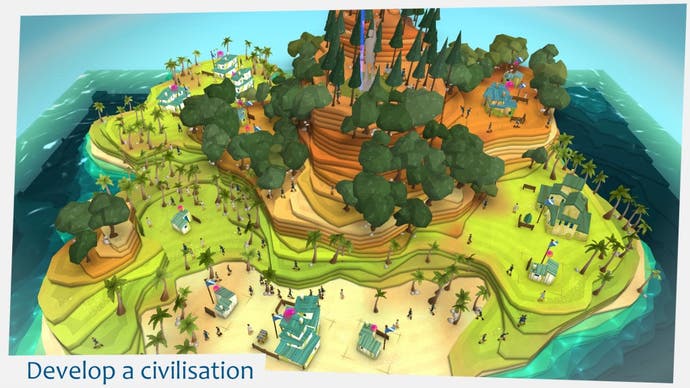
I'd like to discuss some of your design decisions. One issue I've found is the sheer volume of clicking required to shape the land. What's your take on this discussion?
Peter Molyneux: You're absolutely right. We saw that. Through analytics we can see how much clicking has happened between each of the eras. I noticed I made a mistake. The design of the Homeworld you had at the start of the game was wrong, and it meant you had to do far too much sculpting. So we were able to correct that by redesigning the initial landscape so you didn't have to move whole mountains anymore.
The second thing is, you had to do far too much clicking. In the version that's out there at the moment all the houses have flags on them. None of them have got flags now. We've totally removed that rule in the new update. Now the flags only come up when there's something specific for the little people to do. Also, all of these houses used to have purple balls over them. Now we've given you the Settlement Power, and you can connect all these places together so to collect all that Belief you just click once.
So, by looking at the analytics and boards we've actually changed the totally fundamental rules of the game. Now, just in the space of two weeks, by looking at the feedback from people, the game is completely different to play. When you play at the start there's not nearly so much clicking. We instantly are able to react to that sort of stuff. And because I can change the big things as well as the small things in the game, I can totally change the feel of the game. How you review a game like this I don't know.
But to change the land you have to click repeatedly. Why not just let us click once and hold down the mouse button to drag?
Peter Molyneux: We have a new God power so now you can click down with the mouse and pull an entire cliff. So, what's happening on a single cell happens on an entirety of a cliff. So it's less about tapping and more about pulling out big bits of land.
What we're finding is people were spending an insane amount of time carving their way through the land. With the cliff sculpting what would have taken about 10,000 taps now takes about 10.
And then, we are planning something called momentum sculpting. So if I sculpt, then I can carry the sculpt on just with my mouse. I pull a little bit and then I can continue to pull it, pulling land around without clicking.
We're evolving all of the mechanics in the game. It's not just the big things. It's the little things. Just seeing, Christ, people spent 10,000 clicks to click through this! We've got work to do now.
"On mobile free games outsell paid games by twenty to one. It's a ridiculous number."
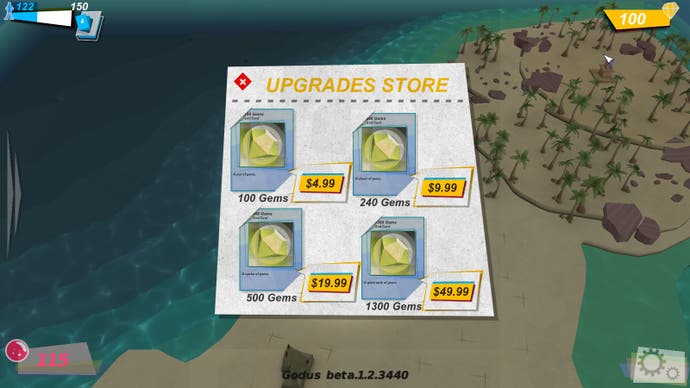
Players were upset when they noticed what looked like an in-game shop, where you could spend real-world money on gems. 22Cans has now said there is no shop in the PC version. But you must have planned something if a space for it is in the game.
Peter Molyneux: I actually like shops in games. This whole thing about micro-transactions and free-to-play has got out of all proportion. Consumers want developers to give extra content, and these shops are a way of doing that.
If you pay £14.95 for Godus, that should give you the complete experience, but like almost every game I've worked on, it doesn't mean we're not going to give you more stuff in addition. Every Fable had an add-on disc. If in Fable we could allow you to download the add-on disc as soon as you'd finished you would take us up on that. And that's the way I think of this shop.
It allows us to proliferate out to people extra content. Some of that may be silly content, like everyone gets a hat or something. Some of it may be big content, like a whole new level. And in Early Access we wanted to test that system. But the actual core of the PC game, you shouldn't need to spend any more money on it. At all. We're not trying to make the PC game into a free-to-play game, for sure not.
The actual truth of it is, on mobile, free games outsell paid games by twenty to one. It's a ridiculous number. So we've got to think about, maybe there's a way of not charging. We haven't decided this yet. Maybe we won't charge to download Godus on mobile, but we'll use some sort of shop mechanic.
But we've got no plan at all of making the shop an integral, necessary part of the game on PC.
When people saw the shop they thought Godus would be a pay-to-win experience, because you can buy gems with real-world money.
Peter Molyneux: What we've decided to do now is not give people the ability to buy gems. In the game you can always get gems. Your people can mine to get gems, for example. So there's no reason for you to buy more stuff. At the moment you can't spend gems on ridiculous stuff. You can't unbalance the game with your gems.
So what can you spend your gems on?
Peter Molyneux: You can spend your gems to speed little things up. And maybe you've only got 10 minutes to play and you just want a bit of Belief from that house, you can speed that individual thing up, but that's not going to unbalance the game.
In the game there are these cards you have to collect. Some of those cards are well hidden. You may find, for example, you need a meat card. You may have been searching for it for so long you think, oh, I'm going to give up. So we allow you to spend your gems on buying that individual card. But that card exists inside the game. You're just being slightly lazy buying that. It's not a blocker. We never ask you to spend gems. It's never a gate.
I think gamers will be worried that is a pay-to-win mechanic.
Peter Molyneux: I think of this as pay to invest. When you're designing a game you try and design it in a way that's pleasing to everyone. Some people are more impatient than other people. At the moment we give you a limited amount of those gems, and if you want to spend those gems on speeding up this card because you can't be bothered to find it in the world, it's up to you. That way, I don't have to make it so generic.
It's part of the experiment. If gems don't work we'll remove them, just like we removed super clicking. It's all part of the experiment. People got heated about it before we'd even begun experimenting with it. But we didn't want to make any more money out of gems. We just wanted to test some of our systems.
So, there's no shop in the PC version right now. Will there be one in the future?
Peter Molyneux: We'll have to see how that goes. If you ask anybody, "Do you need gems to play this game?", no-one would say, "Yes you do." That means maybe it's time to start thinking soon about putting a shop in there. But I'm not going to put a shop in there until people realise we're not creating a free-to-play game. That's not our intention here. We currently have gems turned on but not the ability to buy gems, to allow people to tweak the game experience around what sort of players they are. That's the intention.
"I don't want to spend £49 on games. That's the most greedy way of getting money off people. How many games have you spent this money on and never finished? That's the worst example of monetising."
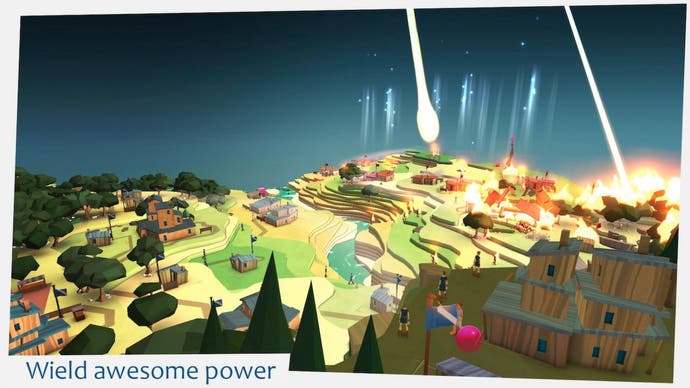
Can you understand the concern around this?
Peter Molyneux: Yeah. There are some terrible experiences with free-to-play stuff where some games get you hooked, just like you get hooked on anything, and then they say, "Right, give me 79p otherwise I'm not going to give you your next treat." That, I think, is caustic, and I can understand people get very emotional about that issue.
But if I describe it in this way: if I'm a consumer and I say, "Oh god, I wish I had this for my game," and this wasn't part of the core experience, it was like an investment in your game, that sounds much more delightful to me.
Do I want to go into a store and pay £49 for a game in five years time? Some form of in-app purchases is the future of these games. £49 is a hell of a lot of money to pay for something without trying it. And what free-to-play at least allows you to do is play the game and see if you like it before spending any of your money on it. As long as we as an industry don't overplay the addiction card and get people hooked and then demand money from them then I think free-to-play should be part of our gaming experience.
I just think at the moment it's one of those issues that's got people all riled up. We need a few good examples of free-to-play to counter the bad examples of free-to-play. But I don't want to spend £49 on games. That's the most greedy way of getting money off people. How many games have you spent this money on and never finished? That's the worst example of monetising people.
We're not going to be stupid. We've already shown we have the possibility of putting a shop in there. We've just chosen not to do it at the moment.
